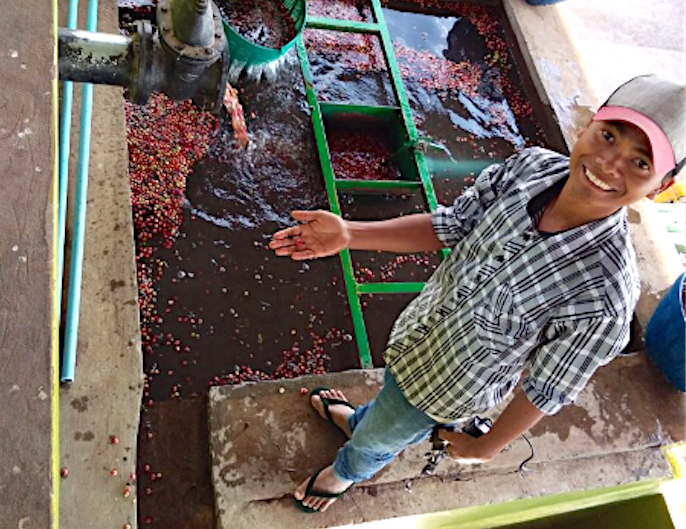Coffee arrived in Myanmar around 1885, through British colonists, and after the country gained political independence in 1948, production largely fell off. Several years ago, however, encouraged by NGOs such as the United States Agency for International Development (USAID), as well as private efforts to grow farmer profitability, specialty coffee came back into favor—and quickly achieved success.
In 2017, the winning lot at the Myanmar Coffee Association Coffee Quality Competition scored 89.58 points, and 26 of the 72 judges at the competition gave scores of 85 or higher, encouraging headlines about the impressive quality being achieved.
Myanmar produces around 8,500 tons of coffee annually, 80 percent of which is Arabica. In 2014, the Mandalay Coffee Group (MCG) was established by local producers who in some cases had been working in coffee for more than 20 years, and the group has since been at the forefront of the country’s growing specialty coffee movement.
But just as Myanmar’s specialty coffee industry began gaining attention for its quality, its government began making headlines for its violence toward the Rohingya ethnic group.
A number of reports have accused the Myanmar government of ethnic-cleansing campaigns in the Rakhine State and even of a systematic genocidal campaign to eliminate Rohingya Muslims.
Many consumers and green buyers have expressed concern about buying coffee from Myanmar and possibly supporting the country’s military efforts. But MCG insists on the need for foreign buyers in the country and for the continued support of coffee farmers.
“MCG is a private business without political affiliation, and our stance is simply that troubled places need engagement,” the MCG board said in a statement.
“The smallholder and estate coffee producers of Myanmar have benefited greatly from the past few years of engagement with the global coffee community, and it would be a shame for buyers to retreat now that they are learning more about this nation that has long been filled with conflict (like many coffee-producing nations). The coffees we sell come from Shan State and Mandalay Division.
The board continued:
Regarding our company in particular, MCG received a significant grant through USAID for the establishment of our dry mill in 2015, and buyers should find some comfort in knowing that the vetting process recipients undergo is very thorough to ensure that corrupt individuals are not involved.
Despite the fact that many of our directors and shareholders have the capacity to leave Myanmar to seek a more comfortable life and less burdensome business climate, they have stayed in large part because they want to contribute to the positive future that lies before Myanmar.
Reform in this country has been slow and often painful, but MCG believes that direct contacts between foreign buyers and local producers can play a powerful role in Myanmar’s growth and development. We are proud to be part of facilitating those connections, and we intend to continue making our best efforts for producers and buyers who share our commitment to coffee quality and long-term relationships.”
Cupping Notes, February 2019
Our Quality Control teams just revisited our lots from Myanmar, and we’re delighted to share the results, which we believe speak to the quality of the processing by MCG:
Myanmar Ywangan Washed (P6148) 4 bags Annex; 18 bags Houston; 137 bags Continental; arrived July 2018.
Dark chocolate, caramel, dried fruit, rich, creamy body, bright acidity.
Myanmar Ywangan Washed (P6147) 9 bags, Continental, arrived July 2018
Cherry, stone fruit, black tea, light citrus; balanced, medium body.
—
Myanmar Moe Htet (P4473) 34 bags Continental, 8 bags Annex, arrived September 2017
Chocolate, nutty, lemon; clean, light acidity.
For more information, on these coffees or others, we always welcome you to give us a call or please email traders.iacus@nkg.coffee. •
